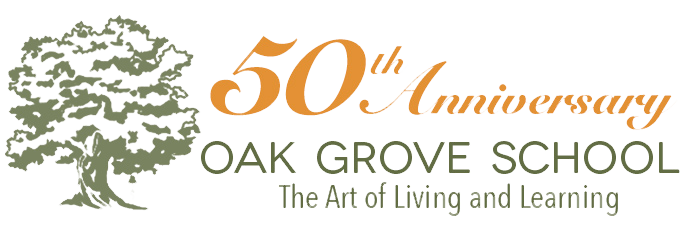About once a month, our high school students attend a Lizard Talk, where a guest speaker presents and shares knowledge on their subject of expertise.
Thank you for being here with us.
Oak Grove’s Head Chef, Julia San Bartolome, reflects on her decision to join the school and the delectable role food plays for the community.
The June 2022 issue of India’s respected magazine, Education World, dives into the importance and relevance of Krishnamurti’s teachings and his global impact on school students and adults alike.
On June 10, we officially said goodbye to the 2021-22 school year and to the Class of 2022. Saying goodbye to a teacher, friend, school, or classmate can be difficult, sad, or perhaps even joyful with expectation for what is to come.
Check out this article in the Daily Optimist about the goats on campus
Join us for the Middle School Graduation!
Congratulations Class of 2022!
My relationship with Oak Grove began when I first visited the campus in 1997. I had never been to Ojai before. My husband Kevin and I came up for the day to see the Krishnamurti school. It was a weekend, so quiet, but I felt connected to this place instantly. This campus has a magic that is difficult to put into words.
Technology keeps us connected in ways not possible during other times in human history. It has saved lives, improved efficiencies, and made for more effective communication. Technology allows us to work remotely, which can have a positive impact on our carbon footprint.
CONTACT OAK GROVE
Oak Grove School of the Krishnamurti Foundation of America
CALL: 805 646 8236
EMAIL: info@oakgroveschool.org
MAIL: 220 West Lomita Avenue
Ojai, California 93023-2244
Latest News
 Annual Fundraising TeaNovember 20, 2025 - 10:49 am
Annual Fundraising TeaNovember 20, 2025 - 10:49 am The Art of Living & LearningNovember 19, 2025 - 5:08 pm
The Art of Living & LearningNovember 19, 2025 - 5:08 pm Gratitude is HumblingNovember 17, 2025 - 2:01 pm
Gratitude is HumblingNovember 17, 2025 - 2:01 pm High School Info Night 12-2-25November 13, 2025 - 11:18 am
High School Info Night 12-2-25November 13, 2025 - 11:18 am Reflections from the KFI Teachers’ ConferenceNovember 5, 2025 - 4:07 pm
Reflections from the KFI Teachers’ ConferenceNovember 5, 2025 - 4:07 pm
Non-Discrimination Policy
Oak Grove School does not discriminate on the basis of any individual or group identity characteristics, such as but not limited to race, color, gender identity or expression, sexual orientation, age, national or ethnic origin, differing mental or physical abilities, or family structure in the administration of its educational or admissions policies, employment practices, scholarship, and other school-administered programs. View the unabridged policy.


